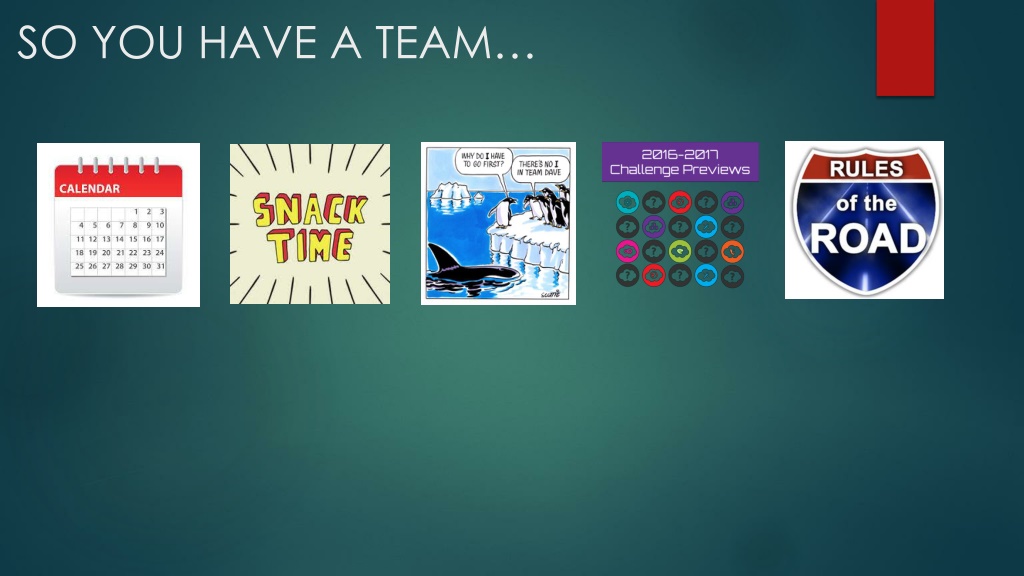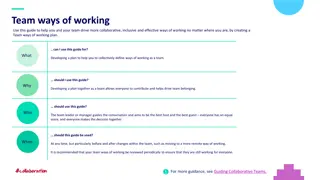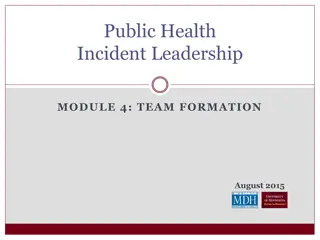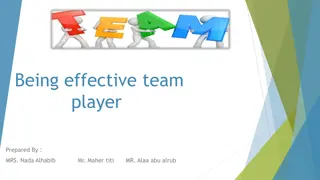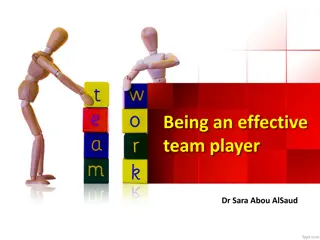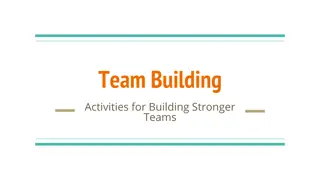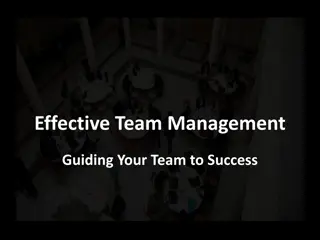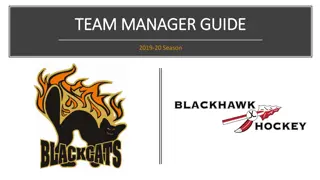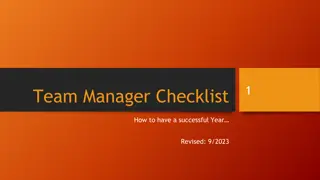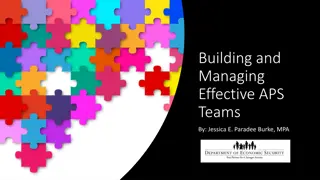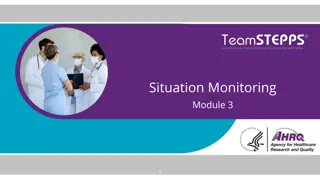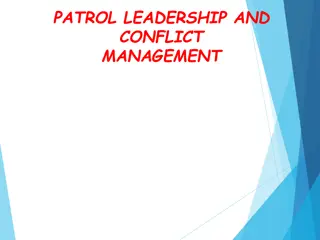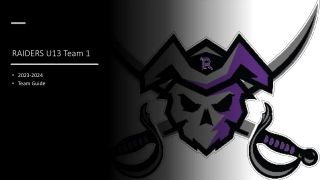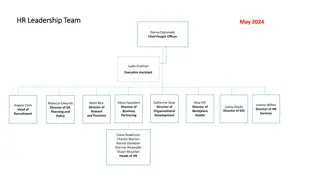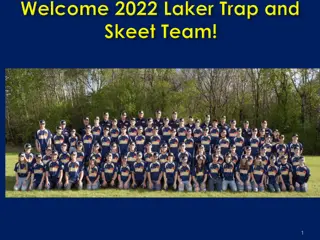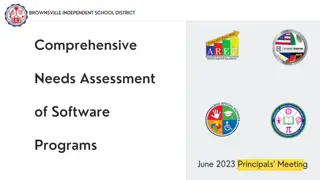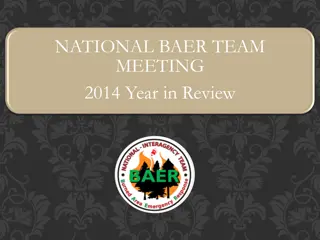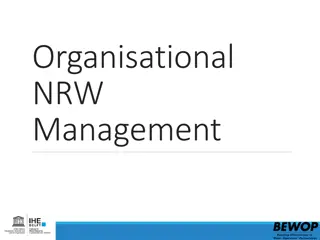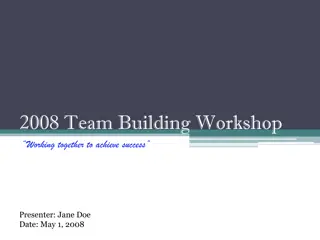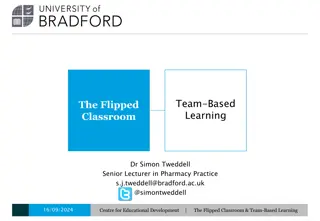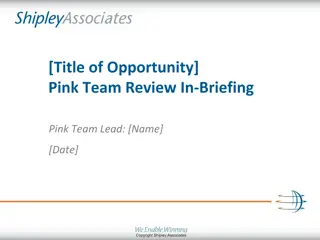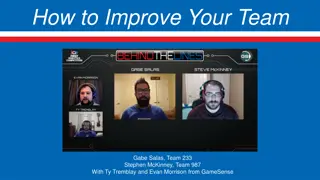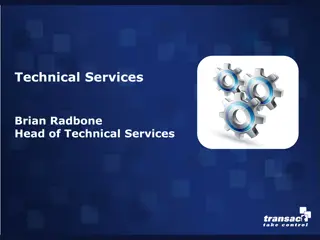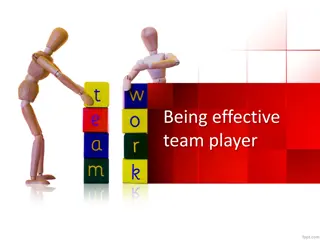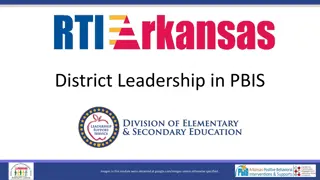Effective Strategies for Team-Based Challenges
In team-based challenges, understanding the challenge thoroughly, breaking down problems, and integrating special elements are crucial. Scripts should be clear, engaging, and include humor or drama. Acting and character portrayal require attention to detail, enunciation, and the use of music or sound effects. These strategies aim to enhance team performance and impress judges.
Download Presentation

Please find below an Image/Link to download the presentation.
The content on the website is provided AS IS for your information and personal use only. It may not be sold, licensed, or shared on other websites without obtaining consent from the author. Download presentation by click this link. If you encounter any issues during the download, it is possible that the publisher has removed the file from their server.
E N D
Presentation Transcript
Understanding the Team Challenge Go through selected challenge thoroughly with highlighter. Note definitions, where the marks are allocated etc Record all their ideas as you sort through the materials incase they hit a dead end later on. Break down bigger problems into smaller problems Break off into research/smaller task groups to brainstorm or research ideas. Have them come back and present their information. Set up a google document for team members to add their ideas whenever they get inspired.
Team Choice Elements We usually go over these in our first few meetings together. Discuss special elements early and often when writing the scripts and making the props, backdrops and costumes. Make sure the judges can see any element you want judged. Exaggerate the moment of it s reveal. Something in the far back of your backdrop or hidden by a standing character may be missed during the presentation and reduce your score. Make sure the special elements are integrated into the presentation (20 points).
Scripts Don't make the audience think too much - it's only a 6-8 minute presentation. How complex is the script? Can you explain your story line to someone else in under a minute or two? Should it be humorous? Humor does sell. Puns sell very well (even if we moan over them). Some of the best performances are very quick-paced and are filled with puns about a given topic. Drama? Drama can be VERY compelling as well though it must be good drama - well written and well acted. Research your topic. Weave facts and interesting details into the play - it shows you ve done your work and can be interesting to judges. What is the conflict - there should be a conflict. Is it simply a re-write of a story that already exists? How creative is this? How many scene changes are involved in the play? Too many scenes can be a problem. Use repetition to get the theme or point across. Ending: What is the ending? Does it grab you? Make you laugh? Make you think? Have a moral at the end? Does it build logically to a conclusion? The ending is the most important part - it wraps up all the ends and is the last impression you make on the judges.
Acting/Characters Acting can be challenging. You will probably make mistakes and must be willing to take constructive criticism from your teammates. How should your character act? How will she walk? Talk? Do they live in Old England or are they simple folk like you and me? Are you exaggerating movements and words so that the audience hears it and understands it easily? Will music or special effects enhance the performance or the understanding of the audience? Can part of the lines be delivered as a song? Can music or other sounds actually reveal what is happening in the play? Enunciate! Nothing can be more important. Have them watch another team perform and they ll soon understand how important it is to be able to hear each character.
Costumes/Backdrops Costumes help you get into character. Costumes instantly show what character you are/where you are. You can wear regular clothes in Scene 1. And then in Scene 2: wear the same clothes but all white to show that you re now in Heaven. Backdrops can be any shape (not just rectangle). What is it s purpose in your presentation? Can it do double duty? Does it move? Light it from behind? Is it easy to set up? Build it to last!
Instant Challenge Break Down Challenge: a brief summary of the Challenge Time: A statement of how much time the team has for each part of the Challenge including brainstorming, preparation, and performance. Many times the brainstorming and preparation components are in one time block. Teams must learn to use their time wisely. The Set-up: This section describes the overall set-up of the room. Team members will be told where they can be located during different parts of the Challenge. Procedure: this section includes the specific rules that the team is to follow. If it doesn't say it here, the team probably can do it. Materials: Items usually will be listed in two columns: those that can be altered (changed) and those the cannot be damaged (changed). Scoring: This section gives the breakdown of how the team will be scored on their solution to the Challenge. When practicing Instant Challenges stress to your team that they must Listen, Listen, Listen to the reading of the challenge!!!
Instant Challenge Performance Tips Did you develop a clear story with a beginning, middle & ending? Did your performance show all the things required in the challenge? If there are imaginary props, did you clearly show them in your performance? How creative was your team in developing your idea? How clear was your delivery? Were you loud enough? Did you have good voice changes? Good gestures? How well did your team work together in the planning and during the presentation? Roles: Timer? Details? Beg/Mid/End? Keep positive? Did all team members contribute?
Instant Challenge Team Tips Never assume anything - don't jump to conclusions. Listen and understand all the information before deciding your approach. Have someone re-word the challenge in order to determine if they understand the goals of the challenge before forming a strategy or manipulating any materials. Team needs to HAVE A PLAN before they solve the challenge. Recognize a good solution when you hear it. Remind your team that every item given to them in an Instant Challenge may have many uses. They should always be looking for "alternative uses" for common items. The team must remember that there are points for teamwork in every Instant Challenge. Some Task-Based Instant Challenges will demonstrate better teamwork skills if they break into sub-groups in order to solve the challenge efficiently in the time allowed (teams may need to practice breaking up into sub-groups matching tasks to individuals specialties). Have team members choose roles: Timer Details Builders Performers Beg/Mid/End
Instant Challenge Manager Tips Debrief after each challenge. Do all types: Task, performance, task/performance, communication. Repeat the instant challenge on a later date if having difficulty with a solution. You can change one or two components to vary it. Make sure they notice how the points are scored. Should they have a team captain? Make sure they notice if there are any limitations (i.e. line team members may not cross, items they may touch or not touch, if something needed to be handed in at certain point ) If you feel that you haven t had enough practice/or before the IC at competition, practice just by reading a challenge out to them and then ask how they would approach the solution. This helps improve their listening skills. Questions might include: What is the goal?, How do you begin?, How would you end?, What rules must you absolutely remember?, Where were the points?, Etc. It s recommended to video tape the teams especially performance solutions.
DOs AND DONTs DO find yourself a Co-Manager or other adult who is willing to step up when you need help? If you have someone willing to share the responsibilities with you, it can make the experience a little less intimidating. If you don t have another adult to help with your team, try to connect with other Team Managers in your town or Region. It helps to be able to chat with other adults who get DI. Check outall the available resources you were given with team package as well as on line. Make sure you are familiar with the Rules of the Road. Talk to other managers today to share concerns, ideas etc Provide as positive an environment as possible (and lots of snacks!) for your team.. It can be our own personal Challenge to muster enthusiasm and patience (especially in mid-February when the meetings can be long, the days are short and the kids are reaching new levels of frustration). Your confidence in them and your encouragement can make a huge difference in their ability to feel capable. Display an itinerary at each meeting so the team knows what goals are (hopefully) going to be accomplished that day. DON T forgetto practice Instant Challenges. Don t sweat the small stuff. Props may not turn out as neat and completed as they (or YOU) had hoped. They may be scrambling last minute to get things but we have to help them feel good about whatever they show up with. Don tinterfere. It can be tempting. But you re doing them a favor by not interfering. It has to be all theirs. The accomplishments, the shortfalls, the obstacles and the lessons. Nothing will make you prouder than watching them figure it all out on their own.
